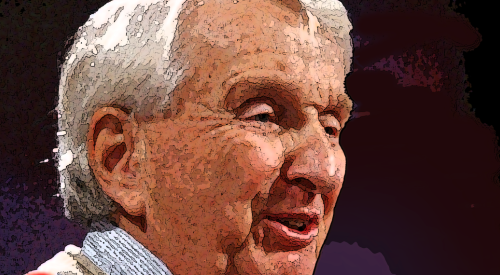Jack Welch, legendary former CEO and chairman of General Electric, is back with another business book: Winning. I wonder why the billionaire would bother. Writing, after all, is hard and frustrating work. Is he bored? Is he trying to further define his legacy? Or perhaps he is just trying to help make things better.
Love him or hate him, Jack Welch was CEO and chairman during the growth of one of the world's most successful companies — General Electric. Whereas other competitors floundered, died or became takeover targets, GE forged ahead with impressive results in a wide variety of industries. That alone, is worthy of respect.
On Monday, April 18, USA Today ran a feature interview with Jack. ("Let people know where they stand, Welch says." USA Today, Apr. 18, 2005.) Most of the half-page story focused on his famous "20/70/10" program requiring managers to force-rank all of their people, every year. Welch calls the program "differentiation," although inside GE, the program was affectionately known as "rank & yank" by workers, managers and executives alike.
How does it work? Each year, employees are ranked in a breakdown of 20 percent stars, 70 percent acceptable performance and 10 percent non-performers. Twenty percent are designated as stars, 70 percent as acceptable performers and 10 percent as non-performers.
The 10 percent are given a chance to move on. If they do not, they are fired. The interview is fascinating, because a seemingly kinder, gentler Welch continually tries to soft peddle his approach, a very different stance from the days when he was known as "Neutron Jack." For example, he responds to the reporter's question on whether to just fire the 10 percent with, "no, that's mean." Another question about firing rates a "No, you've got a bad take on it." A suggestion that politics must play a significant part in how people are rated is dismissed with "You never have a perfect system." As to whether the 20/70/10 forced ranking doesn't put people against one another and undermine teamwork he answers, "No way," and makes an analogy to football that I am still trying to decipher after five readings.
It appears that Jack Welch is now completely out of touch with what goes on in business, or at least what goes on out in the plants, offices and work sites of the rank and file. Every point he denied is exactly what happens in the real world of forced ranking systems. I have seen these programs over the years and the problems with forced ranking are legion. There are the obvious issues of favoritism, politics and the difficulty of building strong relationships with those who are your direct competition for rankings and ultimately, jobs. A quick firing of the bottom 10 percent, despite Jack Welch's protests, is indeed what happens in most systems. Then there is the huge problem of the rankers themselves not being qualified to rank people in the first place. If I have 20 direct reports doing basically the same job, that's one thing. But what happens when I have six or eight main job functions, half of which I don't even understand and could not do myself? Those who are required to perform these rankings almost universally despise the process.
The rarely understood failing of these programs is the impact they have on the 70 percent in the middle. Jack and his executive compatriots figure the huddled masses are happy, getting their cost-of-living raise, blissfully ignorant of where they rank in the 70 percent bracket. Was I ranked "3" and just missed being a star? Was I ranked "9" and just barely kept my job? Ah, they don't care. They're just happy to be collecting their paycheck and boosting the executives' stock options.
But don't you believe it. The system makes them crazy. Rank 10 employees in this scheme designating two stars, one bomb and seven Malcolms in the middle, and I guarantee you that out of those seven, at least three thought they should be a star. Among the four that are left, at least three were petrified that they would be labeled the non-performer. And of the two stars at the top, at least one of those feels undeserving, insecure and spends his time covering his butt, playing politics to stay on top and making other people look bad. Out of the 10, you have a happy superstar, soon to be promoted from the group; a "suspect star" who becomes dysfunctional worrying about keeping his status; three angry folks that weren't picked and don't understand why; three more paranoid associates that just know next year will be their turn to get the axe and one poor soul soon to be dispatched. That leaves one guy who just comes to work every day, oblivious to the pressure, does his job, collects his pay and spends weekends pouring through back issues of "Chip & Circuit World." In other words, you just completely destroyed a team.
Now, some of you are saying, "but but but... you can't argue with GE's success, can you?" Sure you can. No one asks what could GE have done without a Philistine approach to people? They did well, for sure. But plenty of other companies have done better. We'll never know what they may have left on the table.
I refer you back to the Welch interview when he was asked where he first learned this system. "Out on the playground, picking a team," Welch said. "Business is not much different."
Now, Jack Welch is nearly 70, but does that explain his apparent detachment from reality? There has never been a process in history more fraught with politics, favoritism, manipulation and at times down right meanness than the ritual of picking teams for neighborhood games. But Jack, a strong athlete, was always picked first or more likely, arranged to be the guy who was doing the picking. Jack was going places even then. He probably didn't notice the impact on the other kids, without whom, need we be reminded, there is no game.
But you'd better notice. I know only one person in this industry who has a billion dollars like Jack Welch, and its not you. So pay attention to whom you hire and how you bring them up. And if you hire, train and develop your people so poorly that every single year you need to fire 10 percent of them, then I submit that you are the one who should be on the block this year. Just remember, as Jack Welch said, when you get ranked and yanked, it is for your own good?












